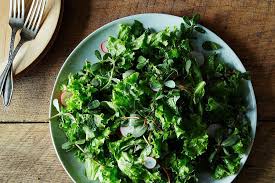Leafy Greens and Vitamin K
Want to give your body a boost?
https://www.myrecipes.com/recipe/candied-walnut-pear-leafy-green-salad
One of the best ways to ensure that our hearts remain healthy and functioning at peak performance is making sure our diets provide the nutrients we need. Leafy green vegetables such as spinach, kale and collard greens are well-known sources of vitamins, minerals and antioxidants and a food choice we should include daily.
https://food52.com/blog/11110-how-to-make-a-better-leafy-salad-without-a-recipe
In addition to the nutrients leafy greens provide, they are also high in dietary nitrates. Dietary nitrates have been shown to reduce blood pressure by decreasing arterial stiffness and improving the function of cells lining the blood vessels. Adding to the benefits of dietary nitrates, leafy greens are also a great source of vitamin K. Vitamin K helps protect our arteries and assist with blood clotting. Our body uses two types of vitamin K – K1 and K2. There are very few individuals who are deficient in vitamin K1, however vitamin K2 deficiency appears to be more common. Our bodies are able to convert vitamin K1 to K2, but that conversion requires that we readily absorb vitamin K1 through proper digestion and are able to provide the proper environment within our digestive tract for the conversion to occur.
Recent studies have suggested that individuals with calcification of the arteries may be deficient in vitamin K2 and supplementing K2 in their diets may reverse the effects of arterial calcification. Any supplementation should be done through doctor supervision, however through our diets, we can work to providing our bodies with the nutrients needed. A spinach salad topped with walnuts or adding a handful of kale and a tablespoon of hemp hearts to your morning smoothie are great ways to combine foods that will assist in nutrient absorption and help give your body a nutritional advantage.
Check out these greens rich in Vitamin K
Denise Boyd RHN and Pilates Instructor @deniseboydpilates


